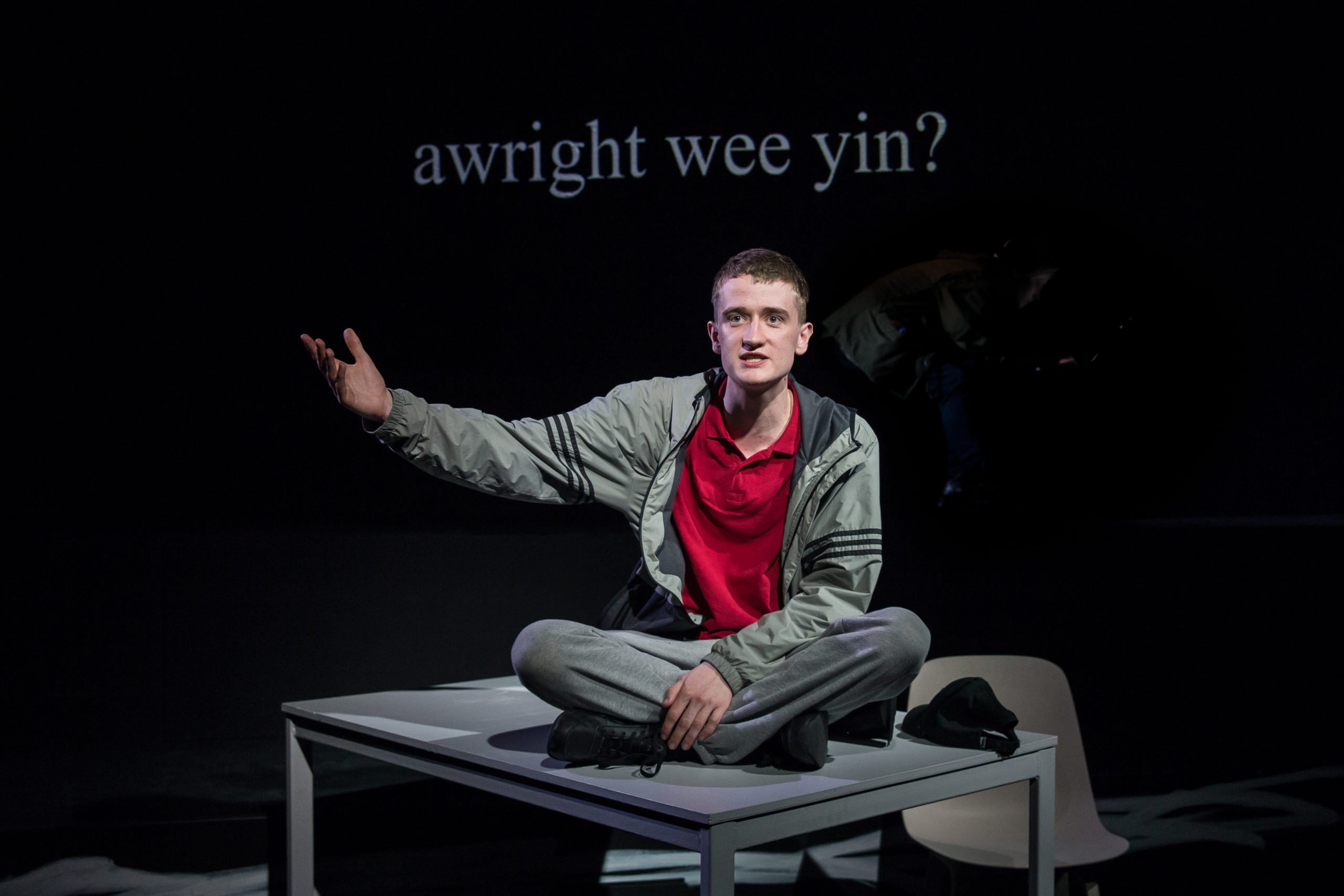[Written by Julia Hegele (she/her)]
[Image Credits: Lara Cappelli (Image of Angus Taylor in Mouthpiece)]
Content Warning: Contains discussion of class struggles.
Mouthpiece opens comfortably. A woman calmly explains the narrative structure of good theatre and the audience nods. All usual tropes are covered: characterisation, rising action, climactic tension. We, as an audience of primarily middle-class city dwellers, are being told what we already know and it is more than welcome. We’re here to see a show about class struggle through the blissfully familiar lense of theatre and, for the first few scenes, it appears that is what the evening will be. The plot revolves around Libby, a downtrodden playwright in her 40s who’s returned to Edinburgh after a painfully mundane career spent trying to achieve fame. She’s rescued from a suicide attempt by Declan, a sharp-edged seventeen-year-old with a penchant for illustration, whose quipping remarks and trackies help establish him as being from the opposite side of Libby’s privileged city.
They bond over art and depression, Declan is introduced to the National Gallery and Libby is inspired by his stories to write a piece of theatre. Throughout the play Libby turns to the audience to keep us informed about her emotions and logical processes, she is a fully fledged character and we are partial to her side of the story. Declan serves as the titular mouthpiece, lending not only his experiences but his voice to Libby’s project and the play as a whole. There are moments of engaging self-referentiality, Declan quips that theatre audiences don’t know what to do with lower-class stories as they’ve never lived them, they get to leave the theatre, chat about the characters over a pint, and forget about them after a few weeks. The audience laughs knowingly. We won’t forget.
The laughter fades as the play reaches its midpoint and we’re informed by Libby that things will be getting worse from this point forward. What now becomes violently clear is the disparity of this negative action. Declan loses everything, his beloved sister, his volatile family, and after a panicked kiss, he loses Libby. He is left alone, shaking precariously as Libby collects herself. While he paces, voiceless in the background, we are treated to stories of her self-care processes, her recovery from this emotional romp, her plans to take the play forward without Declan. The opposite occurs. Declan vocalises his side of the story and launches us through time to the premier of Libby’s co-opted story. He leaps from the streets of Edinburgh to the line outside the theatre to the house of the Tron itself. The performative structure of the piece spills out into the audience like ink, blacking out pre-conceived notions of order and expectation and removing the comfortable limits of traditional proxemics. The audience is enveloped into the action, now implicitly, awkward players in Declan’s story. It was easy to empathise when he was a distant secondary player up on the stage but when he’s crouched next to you, coiled like a spring in the shadows of the house, our immaculately hidden prejudices are more easily exposed. Declan and his leap from acceptable theatrical form are something to be wary of, something unexpected, and therein lies the genius of the performance.
Mouthpiece lays bare the hypocrisy of bourgeois audiences consuming working class stories: we’re happy to pretend to understand the struggles of austerity and poverty, but only from our seats. Only from the pages of a book. Only from the voice of someone like us.
Instead of conforming to the storyline that his middle-class savior has written for him, Declan writes his own ending. Layered exquisitely over Libby’s pre-written epilogue, Declan claims his inherent validity as a person with a voice who harbours hardships that can’t be penned into a performance, expressed in a racing monologue aching with power. He calls for his own black-out and the show ends on his terms, shattering his classification as a mouthpiece and releasing the hold that the performance has on his identity. Painfully raw in its exploration of agency, Mouthpiece should be the litmus test to which we evaluate all stories of class struggle, a brutal example of the lapses in humanity that playwrights can fall into in pursuit of artistic success. This performance is a slap in the face to expectations: an incredibly vital piece that forces viewers to face their own relationship to poverty from a traditionally mute cultural zone. While audiences may have left and dissolved back into their usual routines, the voices of Mouthpiece won’t be something easily forgotten over a pint.

